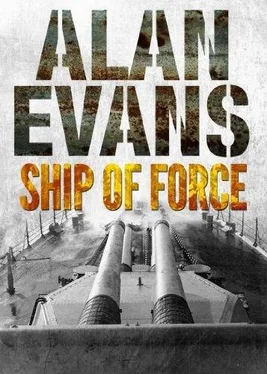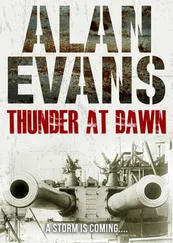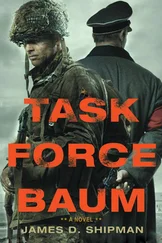“Sir!” Curtis’s hiss snapped Smith’s head around and he saw a second ship to port. Her stem lifted tall out of the sea where she too was anchored and that stem was little more than a cable’s length from the first destroyer in line ahead. The canoe was slipping between them but was only a shadow on a sea filled with shadows. He could see the barrel of the gun on the destroyer’s foredeck, behind it the lift of the bridge and the tracery of mast and rigging.
Two of them. At anchor. If they had been at sea and met Sparrow ! Were there others ahead or astern of them?
Why were they anchored here?
The canoe slipped on as Curtis thrust steadily with the paddle. There was water slapping around Smith’s thighs now and he used his cupped hands to bail but only for a few moments. The destroyers were barely lost behind them when Curtis swung the bow of the canoe to port again. Another ship grew out of the night ahead of them, lower in the water this one and smaller, with one tall funnel amidships and a box of a wheelhouse before it. A tug. They swung around her stern and she, too, was anchored fore and aft and as they swept almost under her counter, light spilled across her deck and the sea as a hatch was opened. They heard the wheeze of a concertina and a man singing slowly, sadly, then the hatch closed and chopped off the light and the voice. For long seconds their night vision was destroyed, then slowly the lights grew out of the darkness again as Curtis drove the canoe on towards the shore. Smith watched the lights come up, thinking. Two big destroyers anchored close inshore, so close inshore as to have precious little water under them at low tide though the tide was flowing now. Were there more? A tug anchored a cable’s length inshore of the destroyers. Was she alone or was there another?
But now he could see more than just the lights, unaware that he was leaning far forward, bent almost double in his eagerness. He could see among them and beyond them and he heard the startled intake of breath behind him as Curtis also stared ahead at the beach and the scene took on shape and life as the canoe closed the shore, as if a curtain were lifted on a stage.
The stage was set. Smith thought: Schwertträger !
The lights were like fireflies, not like stars now because they darted and hovered and he could see the hurrying figures of the men who carried them. But he did not look at the men or the lights but at what they showed. He could see them in the dancing light of the electric torches, and count them. He counted twenty but thought there were more further along the beach that he could not make out, the rain blurring them. The twenty he had counted lay at the water’s edge, stern to the sea and so close to each other they were almost touching. They were square-ended lighters and looked to be around thirty to forty feet long and over ten feet wide. Morris, the airman, had said, ‘Like a shoebox’.
There were others still coming down to the sea. A team of horses, six of them harnessed two by two, laboured down the beach under a cracking whip, hauling a wide-wheeled bogey on which rested another of the lighters. Behind it was another team and another lighter. Morris had said they were hauling the boat in. No doubt they had been. But before that they had hauled it out to the water’s edge, the engineers rehearsing their parts for this, the performance. They were hauling the lighters down through a gap in the wall of the dunes from the woods where they had been collected and hidden. Smith turned to look at Curtis and saw his face glistening oily black under the rain with the whites of the eyes showing and a flash of teeth. He was not paddling but breathing softly through his mouth as if even the sound of his breathing might give them away. Smith called softly, “Closer.”
Curtis glanced at him, then at the beach that already seemed too close for comfort, then back at Smith. But Smith was certain the rain and the darkness would hide them from the engineers who swarmed on the beach, who were working like demons against the clock because they had to beat the tide. And the tugs and destroyers were too far out to spot the tiny black shadow on the sea that was the canoe.
Curtis thought, Much closer an’ you can step over the side and wade in for a real good look. But he wielded the paddle so that the canoe pointed its stem towards the shore again and crept in on the lighters. They crept in until what was a murmur of sound became clear orders, bawled across and up the beach. Voices became linked with individuals, figures; Smith could almost hear the words as they carried over the soft wash of the surf. Now the lighters and the men were close and Smith could judge the size of the lighters against the quick-moving figures of the men and it only confirmed his original estimate of their size.
He saw the team of horses turning then backing down the last shallow slope of the beach with men at their heads as other men heaved at the wheels of the bogey, running it into the surf. The team stopped and engineers moved in on the shoreward end of the bogey. He saw them working and that the bow of the lighter was rising. The front of the bogey was being jacked up; the lighter slid slowly back off as the whip cracked and the horses plunged then settled to the collar and drew the bogey away. The lighter rested on the shore with its stern in the surf. A torch moved for a second over the stern of the lighter and Smith saw the propeller, the rudder, and thought each boat probably had a small petrol engine. He could smell petrol.
Forty of them, and more. As the canoe pushed through the darkness against the set of the tide and parallel to the shore he could see the line of lighters still stretching on into the night. Each would hold — what? A platoon — more likely half a company? The men were coming down the beach now as the last of the lighters were brought down, moving in black phalanxes tipped by a rippling fringe of muzzles of slung rifles. The marines who had boarded the train at Zeebrugge but never arrived at Ostende. A phalanx headed for each lighter and they looked to be half a company or close to it. One-two-three thousand men? A ghost army, their boots stepping rigidly in time but silent on the sand against the cracking of the whips and the bawled orders.
And guns. They were being hauled down by teams of horses and there was a crane on a bogey to hoist each gun into a lighter. The guns rolled on wheels inordinately wide, wheels wide as barrels so they rode easier and those wide wheels would have even more point when the guns had to be disembarked because there would be no horses on the waiting beach…
Curtis paddled delicately, slowly, seeing those troops close, the engineers at work, thinking, How much farther? How much longer? For God’s sake! Does he want to count their buttons?
Smith still stared at the shore. A flat calm. A dark, rainy night. A spring tide that would be high at 4.10 a.m. just before dawn, in that first twilight before the sun rose. The tugs to tow the lighters to Nieuport and the destroyers as escort for all of them. They would be less than three hours at sea and the tugs would slip the lighters and Morris’s shoe-boxes would start their little engines that would yet be big enough to drive the lighters inshore on a flowing tide, through the last of the shallows that the tugs could not pass and into the surf to ground on the beach…
Time.
That first grey light was barely four hours away. The German engineers had run a race against the clock. They’d had to start bringing down the lighters as the tide still fell so that they would be lined along the beach ready to float when the tide started to flow and with four hours or more to spare before high water. The lighters would have to be worked out until the tugs could pick them up and pass the tow. Then three hours at sea at four or five knots. They’d had no more than two hours between the ebbing of the tide below the water-line now and this moment when the sea returned — but they had done it. So the lighters would be loaded with their men and their guns easily while their flat bottoms rested solidly on the shore. No soldier would need to wade out to a lighter to climb aboard.
Читать дальше












